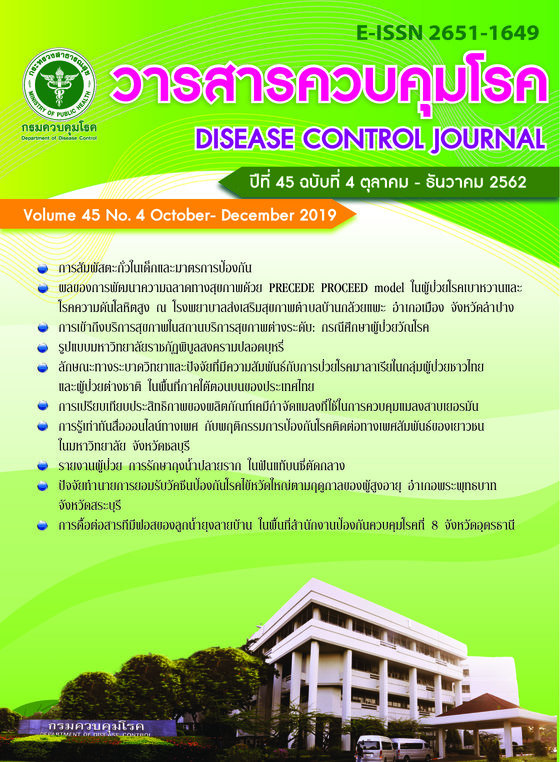Predictive factors associated with the acceptance of seasonal influenza vaccination for the elderly in Phra Phutthabat District, Saraburi Province
DOI:
https://doi.org/10.14456/dcj.2019.39Keywords:
seasonal influenza vaccination, vaccination acceptance, the elderlyAbstract
The purposes of this predictive research were to study the predictive factors associated with the acceptance of seasonal influenza vaccine and its acceptance level of the elderly in Phra Phutthabat District, Saraburi Province. By using multistage cluster sampling, 382 samples, who are senior citizens aged >65 years, were included in this study. Data were collected using a questionnaire, which was created based on the Health Belief Model and the concept of access to health services. The content validity of the questionnaire was confirmed by the panel of experts and its index was 0.97. The reliability value of the questionnaire was 0.88. Data were analyzed using descriptive statistics, Pearson‘s correlation coefficient, and multiple regression analysis. The results showed that the elderly acceptance level (78.0%) of seasonal influenza vaccination was high. Income, history of previous influenza vaccination, information, advice, knowledge, perception of susceptibility, severity, benefits, barriers, and accessibility to receive influenza vaccination were found to have statistically significant association with the acceptance of seasonal influenza vaccine. In parallel with this finding, knowledge, perception of susceptibility, benefits, barriers, accessibility to receive influenza, history of previous influenza vaccination, and income were statistically significant predictors of the acceptance of seasonal influenza vaccine. These seven predictive variables accounted for 41.2% of the prediction of seasonal influenza vaccine.
References
2. Bureau of Epidemiology, Department of Disease Control, Ministry of Public Health. National Disease Surveillance (Report 506): Summary of influenza situation in 2017 [Internet]. 2017 [cited 2018 Feb 25]. Available from: https://www.boe.moph.go.th/boedb/surdata/506wk/y60/d15_5360.pdf (in Thai)
3. Office of Disease Prevention and Control Region 4, Saraburi. Report of seasonal influenza 2560-2561 of program R506. Saraburi: Office of Disease Prevention and Control Region 4, Saraburi; 2018. (in Thai)
4. Bureau of General Communicable Diseases, Department of Disease Control, Ministry of Public Health. Vaccine and immunization promotion textbook 2013. Nonthaburi: Bureau of General Communicable Diseases; 2013. (in Thai)
5. National Vaccine Institute (NVI). The essence of the National Vaccine Committee and Subcommittee meetings. Bangkok: O-VIT (THAILAND); 2010. (in Thai)
6. Sonthichai C. Influenza Vaccine. DDC WATCH 2017;4:1-4. (in Thai)
7. World Health Organization. Vaccine use [Internet]. 2018 [cited 2018 Feb 25]. Available from: https://www.who.int/influenza/vaccines/use/en/
8. National Health Security Office (NHSO). NHSO's Annual report year 2018 [Internet]. 2018 [cited 2019 Jun 29]. Available from: https://www.nhso.go.th/frontend/page-about_result.aspx (in Thai)
9. Tipayamongkholgul M, Praphasiri P, Ditsoongnoen D, MuangchanaC. Difficulties and obstacles of influenza vaccine management in Thailand. Journal of Public Health 2016;46:31-41. (in Thai)
10. Injumpa C, Thato R. Factors predicting acceptability of human papillomavirus vaccine among men who have sex with men. Journal of Boromarajonani College of Nursing, Bangkok [Internet]. 2014 [cited 2018 Feb 25];30:10-1. Available from: https://tci-thaijo.org/index.php/bcnbangkok/article/view/29273 (in Thai)
11. Daniel WW. Biostatistics: a foundation for analysis in the health sciences. 4th ed. New York: John Wiley & Sons; 1987.
12. Mo PK, Lau JT. Influenza vaccination uptake and associated factors among elderly population in Hong Kong: the application of the Health Belief Model. Health Educ Res 2015;30:706-18.
13. Kan T, Zhang J. Factors influencing seasonal influenza vaccination behaviour among elderly people: a systematic review. Public Health 2018;156:67-78.
14. Ho R. Handbook of univariate and multivariate data analysis and interpretation with SPSS. Florida: Chapman & Hall/CRC, Boca Raton; 2006.
15. Sarantakos S. A toolkit for quantitative data analysis using SPSS. New York: Palgrave Macmillan; 2007.
16. Maiman LA, Becker MH. The Health Belief Model: origin and correlates in psychological theory. Health Educ Monogr 1974;2:336-53.
17. Eilers R, Krabbe PF, de Melker HE. Factors affecting the uptake of vaccination by the elderly in Western society. Prev Med 2014;69:224-34.
Downloads
Published
How to Cite
Issue
Section
License
Articles published in the Disease Control Journal are considered as academic work, research or analysis of the personal opinion of the authors, not the opinion of the Thailand Department of Disease Control or editorial team. The authors must be responsible for their articles.



.png)



